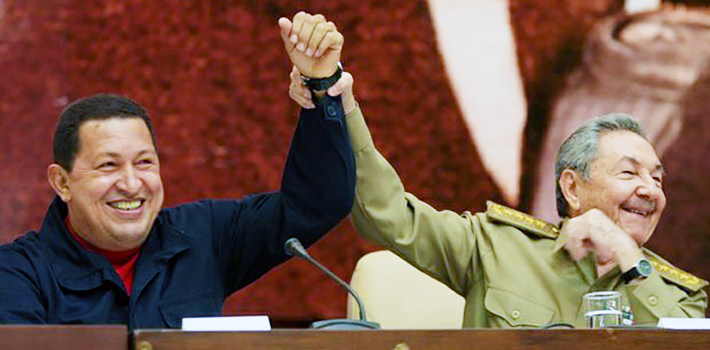EspañolThe great difference between honest and dishonest rulers is that for the latter, money and public property are “booty.” And it is important to understand that wealth is not all that is at stake — above all, it is about political power.
This is the reason why those who have authoritarian tendencies advocate for and impose nationalization and interventionism for different areas of the economy. The greater the portion that is in the hands of the “state” — which in reality is no more than the rulers and their bureaucracies — the more power they accumulate.
Venezuela is a particular case, since different rulers have managed to structure the economy so that the national wealth is concentrated in one sector: the oil business. Indeed, about 80 percent of Venezuela’s export earnings come from the hydrocarbon. Consequently, whoever takes over oil production will be the master of Venezuelans.
The root cause of the now widely known disintegration that common Venezuelans mourn today originates in 1973 and the decision by OPEC to limit oil production. That caused prices to soar, and they continued at an elevated level through 1976, during the administration of President Carlos Andrés Pérez and the establishment of oil nationalization. Oil prices then climaxed with the late Hugo Chávez, who blatantly proclaimed himself to be the “lord and master” of national oil resources, with absolute dominion over them.
From there onwards, the South American Napoleon launched his campaign — checkbook in hand — to conquer the continent. Using the medium of “petro-diplomacy,” Chávez “did business” with those rulers he considered useful for his project of installing “21st Century Socialism” far and wide. He wanted to emulate and simultaneously outperform Fidel Castro, achieving what the Cuban dictator craved but could not carry out.
All business conducted by Chávez was based on oil, whether delivering it on very favorable terms or using the money from its sale. Broadly, the scheme has been as follows: the beneficiary ruler pays 40 percent of the cost of the oil supplied within 90 days, in cash or in kind. The rest is financed, to be paid within a period of 17-25 years, with two years of grace. The annual interest rate is 1 percent.
He made such agreements with Nicaragua, Bolivia, Ecuador, Argentina, Brazil, and Uruguay — but by far the biggest beneficiary was Cuba. For the last 14 years, Chávez, and now his political heirs, have been giving the Castro brothers 100,000 barrels per day at preferential prices, which they are not able to pay even on these terms. Half of the oil delivered is financed for 25 years.

Whenever a contract of this type is signed, the regime tells the media that these deals are beneficial to both parties, that they are made in the interest of the peoples of both countries. For example, after signing one of these cooperation agreements, Evo Morales said that it would “benefit the Bolivian and Venezuelan people and not capitalism or imperialism … Against neocolonialism there is the communitary neosocialism of the 21st century, which seeks the dignity of peoples.”
But the reality is different. Cubans continue to suffer serious shortcomings in all walks of life. Argentineans are in the midst of an economic and financial crisis of incalculable proportions. Bolivians, Nicaraguans, and Ecuadorians see their quality of life descend under protectionism. And Uruguayans still manage to achieve the “honor” of the most expensive fuel in the region, and the world’s most expensive gasoline.
But worst of all, the most outrageous and immoral outcome, is what has happened to Venezuelans themselves. As the “generosity” of Chavismo has spread throughout the world, Venezuelans have become increasingly impoverished. The supermarket shelves of the oil-rich country have emptied out, and people now queue for several hours to get the most essential items.
As predicted in a study conducted by SR Solchaga Recio, “Latin American Perspectives 2014,” this year Venezuela’s GDP will fall by 0.6 percent, and experience a 56 percent inflation rate — well on the path towards hyperinflation. The report also predicts that the economy will collapse in 2014, amid a fiscal and foreign exchange disaster.
These are the concerns that ordinary Venezuelans, led by the students, are demonstrating peacefully against in the streets. They demand respect for human rights, guarantees for the freedoms necessary to ensure genuine democracy, the release of political prisoners, and an end to harassment of opponents. And above all things, they scream, “Cubans, go home!”
The reactions of the various leaders and organizations are closely linked to the degree of participation in the spoils that Chávez has been distributing among his acolytes. It is amusing to see them tear their hair out saying they don’t condemn the brutality of the Chavista regime, lest they commit the sin of “interventionism” — or when Nicolás Maduro accuses political leaders and organizations that demand he cease violence against the defenseless civil society of “meddling in Venezuelan affairs.” Such cynicism is staggering.
The situation arising in the region since the advent of Chávez in power fits like a glove with this reflection by Saint Augustine:
Justice being taken away, then, what are kingdoms but great robberies?… The band itself is made up of men; it is ruled by the authority of a prince, knit together by the pact of the confederacy; the booty is divided by the law agreed on. If, by the admittance of abandoned men, this evil increases to such a degree that it holds places, fixes abodes, takes possession of cities, and subdues peoples, it assumes more plainly the name of a kingdom, because the reality is now manifestly conferred on it, not by the removal of covetousness, but by the addition of impunity.
 Versión Español
Versión Español












